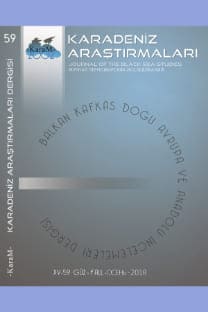Soğuk Savaş Sonrası Dönemde Romanya'nın Dış Politikasında Batı Dünyası ve Türkiye'yle İlişkiler
Soğuk savaş dönemi süresince Doğu bloğu üyeleriyle ortak paydada buluşan Romanya, 1980li yıllar boyunca uluslararası dengelerde meydana gelen değişmeler ve bunun sonucu olarak Doğu'daki temsilcinin mağlubiyetiyle birlikte dış politika ekseninde yeni arayışlar içerisine girmiştir. Doğu Avrupa ülkeleri 1991 sonrasında ekonomik, siyasi ve güvenlik bağlamında Batı'ya doğru yönelirlerken, Romanya boyutunda da aynı durum kaçınılmaz olmuştur. Buda değişen dünya şartlarına uyum sağlamak, uluslararası dengelerde yer alabilmek ve 1990lı yıllarda Balkan coğrafyasında meydana gelen sıcak çatışma ortamının yol açtığı tehdit algılamaları Romanya açısından Batı Dünyası ile işbirliğini zorunlu kılarken, buna paralel mahiyette Avrupa Birliği ve NATO gibi temel nitelikteki Batı örgütlenmelerine tam üyelik hedefi öncelikli hale gelmiştir. Diğer taraftan, Türkiye-Romanya ilişkilerinde soğuk savaş sonrası dönemde meydana gelen iyileşme gerek bölgesel (Karadeniz ve Balkanlar) denklemlerde gerekse Batı perspektifinde incelemeye değer bir konu olmuştur.
Anahtar Kelimeler:
Romanya, Avrupa Birliği, NATO, Türkiye, dış politika, soğuk savaş sonrası.
Relations with the West and Turkey after the Cold War Era in the Foreign Policy of Romania
Ar the end of the Cold War, Romania changed its foreign policy perspective from the East to the West. Important changes occurred in Romania as a direct result of its decision to choose becoming a member of EU and NATO as its first priority. The EU and NATO encouraged Romania to establish a democratic system and to make reforms in the areas of politics, economics, and security. Furthermore, the relations between Turkey and Romania made a good progress in the period after the Cold War when compared to the past as a result of orientation towards the West in terms of foreign policy of Romania and regional issues. This article examines the journey of Romania to the West and its relationship with Turkey and the Western World after the Cold War. In addition, to understand Romania's current foreign perspective, it was necessary to explore the political history of the country.
Keywords:
Romania, European Union (EU), North Atlantic Treaty Organisation (NATO), Turkey, foreign policy, aft,
- ISSN: 2536-5126
- Yayın Aralığı: Yılda 4 Sayı
- Başlangıç: 2004
- Yayıncı: Osman Karatay
Sayıdaki Diğer Makaleler
Birinci Dünya Savaşı öncesinde Ermeni Faaliyetlerinden Kısa Bir Kesit
Trabzon Yöresi Sözlü Kültür Geleneğinde İcra Töresi ve Ortamı Açısından Kemençecilik
Ermeni Kıpçakçasında Edat Gibi Kullanılan İsimler
Balkanlardan Muğla'ya Göç ve Sosyo-Ekonomik Değişim
Kalkınma Dinamikleri ve Sorunları Bakımından Kelkit Havzası'nın Genel Bir Sosyolojik Değerlendirmesi
Müziğin Tedavideki Yeri ve Şekli
Soğuk Savaş Sonrası Dönemde Romanya'nın Dış Politikasında Batı Dünyası ve Türkiye'yle İlişkiler
Türk Gravür Baskı Sanatının Doğuşu ve Öncü Bir Sanatçı Mürşide İçmeli
